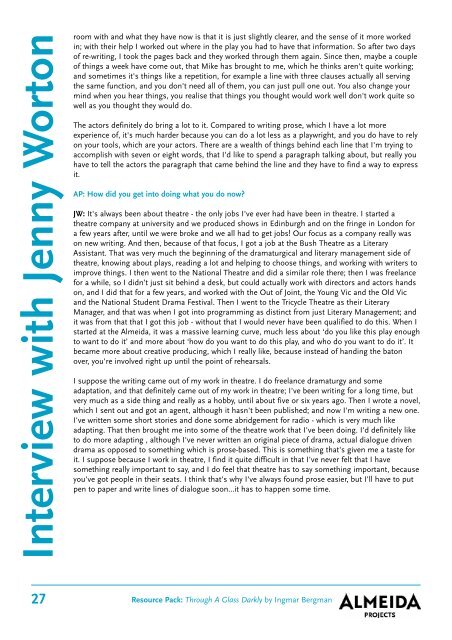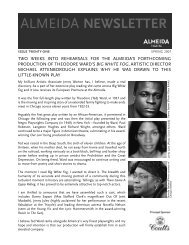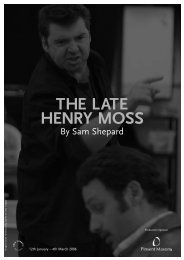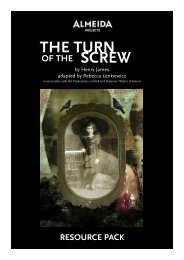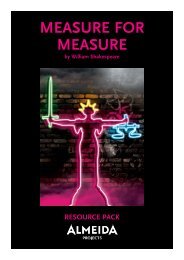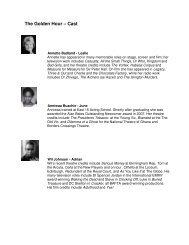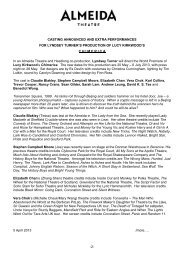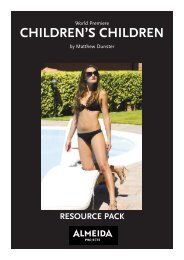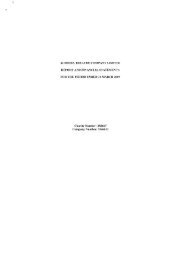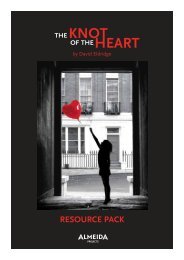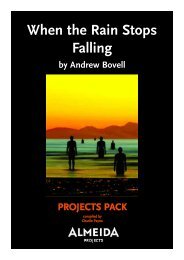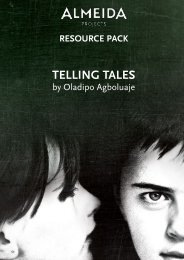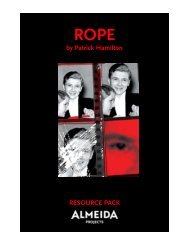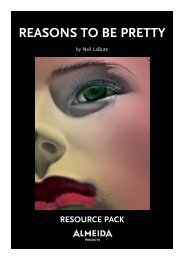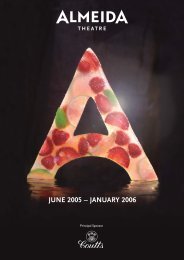Through a Glass Darkly - Almeida Theatre
Through a Glass Darkly - Almeida Theatre
Through a Glass Darkly - Almeida Theatre
- No tags were found...
Create successful ePaper yourself
Turn your PDF publications into a flip-book with our unique Google optimized e-Paper software.
Interview with Jenny Wortonroom with and what they have now is that it is just slightly clearer, and the sense of it more workedin; with their help I worked out where in the play you had to have that information. So after two daysof re-writing, I took the pages back and they worked through them again. Since then, maybe a coupleof things a week have come out, that Mike has brought to me, which he thinks aren't quite working;and sometimes it's things like a repetition, for example a line with three clauses actually all servingthe same function, and you don't need all of them, you can just pull one out. You also change yourmind when you hear things, you realise that things you thought would work well don't work quite sowell as you thought they would do.The actors definitely do bring a lot to it. Compared to writing prose, which I have a lot moreexperience of, it's much harder because you can do a lot less as a playwright, and you do have to relyon your tools, which are your actors. There are a wealth of things behind each line that I'm trying toaccomplish with seven or eight words, that I'd like to spend a paragraph talking about, but really youhave to tell the actors the paragraph that came behind the line and they have to find a way to expressit.AP: How did you get into doing what you do now?JW: It's always been about theatre - the only jobs I've ever had have been in theatre. I started atheatre company at university and we produced shows in Edinburgh and on the fringe in London fora few years after, until we were broke and we all had to get jobs! Our focus as a company really wason new writing. And then, because of that focus, I got a job at the Bush <strong>Theatre</strong> as a LiteraryAssistant. That was very much the beginning of the dramaturgical and literary management side oftheatre, knowing about plays, reading a lot and helping to choose things, and working with writers toimprove things. I then went to the National <strong>Theatre</strong> and did a similar role there; then I was freelancefor a while, so I didn’t just sit behind a desk, but could actually work with directors and actors handson, and I did that for a few years, and worked with the Out of Joint, the Young Vic and the Old Vicand the National Student Drama Festival. Then I went to the Tricycle <strong>Theatre</strong> as their LiteraryManager, and that was when I got into programming as distinct from just Literary Management; andit was from that that I got this job - without that I would never have been qualified to do this. When Istarted at the <strong>Almeida</strong>, it was a massive learning curve, much less about ‘do you like this play enoughto want to do it’ and more about ‘how do you want to do this play, and who do you want to do it’. Itbecame more about creative producing, which I really like, because instead of handing the batonover, you're involved right up until the point of rehearsals.I suppose the writing came out of my work in theatre. I do freelance dramaturgy and someadaptation, and that definitely came out of my work in theatre; I've been writing for a long time, butvery much as a side thing and really as a hobby, until about five or six years ago. Then I wrote a novel,which I sent out and got an agent, although it hasn't been published; and now I'm writing a new one.I've written some short stories and done some abridgement for radio - which is very much likeadapting. That then brought me into some of the theatre work that I've been doing. I'd definitely liketo do more adapting , although I've never written an original piece of drama, actual dialogue drivendrama as opposed to something which is prose-based. This is something that's given me a taste forit. I suppose because I work in theatre, I find it quite difficult in that I've never felt that I havesomething really important to say, and I do feel that theatre has to say something important, becauseyou've got people in their seats. I think that's why I've always found prose easier, but I'll have to putpen to paper and write lines of dialogue soon...it has to happen some time.27Resource Pack: <strong>Through</strong> A <strong>Glass</strong> <strong>Darkly</strong> by Ingmar Bergman


